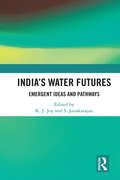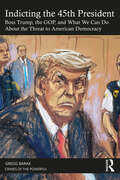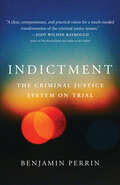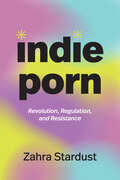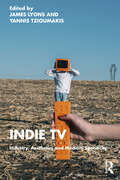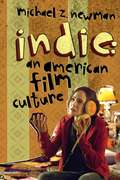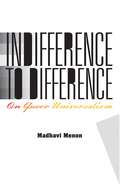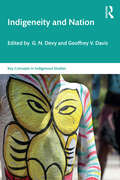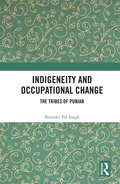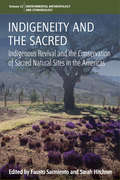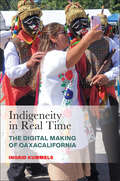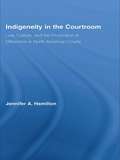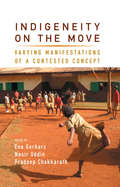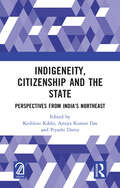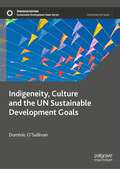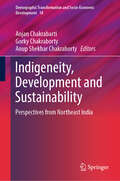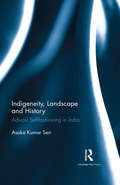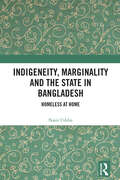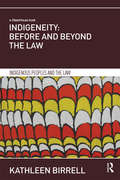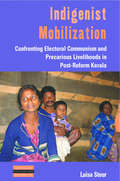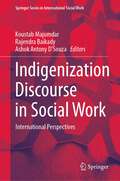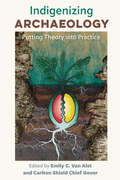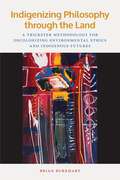- Table View
- List View
India’s Water Futures: Emergent Ideas and Pathways
by K. J. Joy S. JanakarajanWhen it comes to water, we flush and forget. We use, abuse and almost never recycle. Water sector in India, since the 1990s, has seen some new ideas formalised legally and institutionally, while others are still emerging and evolving. Confronting the reality of current water management strategies, this volume discusses the state of the Indian water sector to uncover solutions that can address the imminent water crises. This book: Analyses the growing water insecurity, increase in demand, inefficiency in water use, and growing inequalities in accessing clean water; Sheds light on water footprint in agricultural, industrial and urban use, pressures on river basin management, depleting groundwater resources, patterns of droughts and floods, watershed based development and waste water and sanitation management; Examines water conflicts, lack of participatory governance mechanisms, and suggests an alternative framework for water regulation and conflict transformation; Highlights the relationship between gender discourse and water governance; Presents an alternative agenda for water sector reforms. This volume, with hopes for a more water secure future, will interest scholars and researchers of development studies, environment studies, public policy, political studies, political sociology, and, NGOs, media and think tanks working in this area.
Indicting the 45th President: Boss Trump, the GOP, and What We Can Do About the Threat to American Democracy (Crimes of the Powerful)
by Gregg BarakIndicting the 45th President is a sequel to Criminology on Trump in real time, continuing the criminological investigation into the former US president. Developing and expanding on the themes of family dynamics, deviance, deception, dishonesty, and the weaponization of the law, this book offers the next chapter on the world’s most successful outlaw.In this new book, Gregg Barak considers the campaigns and policies, the corruption, the state- organized abuses of power and obstructions of justice, the pardons, the failed insurrection, the prosecutions, the indictment of Trump and the politics of punishment as these revolve around the Trumpian character and social structures that encourage such crimes of the powerful. Barak also thoroughly addresses the threat to American Democracy, critiques the current state of the U.S. constitutional system, and proposes reforms to enhance justice for all in the United States.Another accessible and compelling read, this is essential reading for all those engaged with state and white- collar crime in the context of power and privilege, and those seeking a criminological understanding of Trump’s evasion of law and justice.
Indictment: The Criminal Justice System on Trial
by Benjamin PerrinBased on first-hand interviews with survivors, people who have committed offences, and others on the frontlines, Indictment puts the Canadian criminal justice system on trial and proposes a bold new vision of transformative justice. #MeToo. Black Lives Matter. Decriminalize Drugs. No More Stolen Sisters. Stop Stranger Attacks. Do we need more cops or to defund the police? Harm reduction or treatment? Tougher sentences or prison abolition? The debate about Canada’s criminal justice system has rarely been so polarized – or so in need of fresh ideas. Indictment brings the heartrending and captivating stories of survivors and people who have committed offences to the forefront to help us understand why the criminal justice system is facing such an existential crisis. Benjamin Perrin draws on his expertise as a lawyer, former top criminal justice advisor to the prime minister, and law clerk at the Supreme Court of Canada to investigate the criminal justice system itself. Indictment critiques the system from a trauma-informed perspective, examining its treatment of victims of crime, Indigenous people and Black Canadians, people with substance use and mental health disorders, and people experiencing homelessness, poverty, and unemployment. Perrin also shares insights from others on the frontlines, including prosecutors and defence lawyers, police chiefs, Indigenous leaders, victim support workers, corrections officers, public health experts, gang outreach workers, prisoner and victims’ rights advocates, criminologists, psychologists, and leading trauma experts. Bringing forward the voices of marginalized people, along with their stories of survival and resilience, Indictment shows that a better way is possible.
Indie Cinema Online
by Sarah E.S. SinwellIndie Cinema Online investigates the changing nature of contemporary American independent cinema in an era of media convergence. Focusing on the ways in which modes of production, distribution, and exhibition are shifting with the advent of online streaming, simultaneous release strategies, and web series, this book analyzes sites such as SundanceTV, YouTube, Netflix, Hulu, and other online spaces as a means of redefining independent cinema in a digital era. Analyzing the intersections among cinema studies, cultural studies, and new media studies within contemporary convergence culture, author Sarah E.S. Sinwell looks at sites of media convergence that are often ignored within most studies of digital media. Emphasizing the ways in which the forms and technologies of media culture have changed during the age of convergence, this book analyzes contemporary production, distribution, and exhibition practices as a means of examining the changing meanings of independent cinema within digital culture.
Indie Porn: Revolution, Regulation, and Resistance (a Camera Obscura book)
by Zahra StardustIn Indie Porn, Zahra Stardust examines the motivations and interventions of independent porn producers as they navigate criminal laws, risk-averse platforms, discriminatory algorithms, and rampant piracy. Herself a porn performer and participant, Stardust takes readers behind the scenes, offering intimate insights into this sociopolitical movement. She finds politicians who watch porn in parliament, protesters leading face-sitting demonstrations, sex workers making COVID-safe pornography, and artists reverse-engineering porn detection software. Against the backdrop of a global gig economy, Stardust documents the promises of indie porn to democratize content, revolutionize production, and redistribute wealth while outlining the fantasies of regulators, whose illusions of what porn is and does foreclose possibilities for transformation. Inevitably, as these paradigms collide, porn producers engage in creative tactics to hustle for survival and visibility, from ethical certification to law reform, sometimes reproducing hierarchies of stigma themselves. By highlighting how porn stigma is bound up with intersecting oppressions, Stardust identifies these junctions as coalitional opportunities for changing social relationships to sex, work, and capitalism.
Indie TV: Industry, Aesthetics and Medium Specificity
by Yannis Tzioumakis James LyonsThis edited collection is the first book to offer a wide-ranging examination of the interface between American independent film and a converged television landscape that consists of terrestrial broadcasters, cable networks and streaming providers, in which independent film and television intersect in complex, multifaceted and creative ways. The book covers the long history of continuities and connections between the two sectors, as seen in the activities of PBS, HBO or Sundance. It considers the movement of filmmakers between indie film and TV such as Steven Soderbergh, Rian Johnson, the Duplass brothers, Joe Swanberg, Lynn Shelton and Gregg Araki; details the confluence of aesthetic and thematic elements seen in shows such as Girls, Breaking Bad, Master of None, or Glow; points to a shared interest in regional sensibilities evident in shows like One Mississippi or Fargo; and makes the case for documentaries and web series as significant entities in this domain. Collectively, the book builds a compelling picture of indie TV as a significant feature of US screen entertainment in the 21st Century. This interdisciplinary landmark volume will be a go-to reference for students and scholars of Television Studies, Film Studies and Media Studies.
Indie: An American Film Culture (Film and Culture Series)
by Michael Z. NewmanAmerica's independent films often seem to defy classification. Their strategies of storytelling and representation range from raw, no-budget projects to more polished releases of Hollywood's "specialty" divisions. Yet understanding American indies involves more than just considering films. Filmmakers, distributors, exhibitors, festivals, critics, and audiences all shape the art's identity, which is always understood in relation to the Hollywood mainstream.By locating the American indie film in the historical context of the "Sundance-Miramax" era (the mid-1980s to the end of the 2000s), Michael Z. Newman considers indie cinema as an alternative American film culture. His work isolates patterns of character and realism, formal play, and oppositionality and the functions of the festivals, art houses, and critical media promoting them. He also accounts for the power of audiences to identify indie films in distinction to mainstream Hollywood and to seek socially emblematic characters and playful form in their narratives. Analyzing films such as Welcome to the Dollhouse (1996), Lost in Translation (2003), Pulp Fiction (1994), and Juno (2007), along with the work of Nicole Holofcener, Jim Jarmusch, John Sayles, Steven Soderbergh, and the Coen brothers, Newman investigates the conventions that cast indies as culturally legitimate works of art. He binds these diverse works together within a cluster of distinct viewing strategies and invites a reevaluation of the difference of independent cinema and its relationship to class and taste culture.
Indifference to Difference: On Queer Universalism
by Madhavi MenonIndifference to Difference organizes around Alain Badiou&’s suggestion that, in the face of increasing claims of identitarian specificity, one might consider the politics and practice of being indifferent to difference. Such a politics would be based on the superabundance of desire and its inability to settle into identity. Madhavi Menon shows that if we turn to another kind of universalism—not one that insists we are all different but one that recognizes we are all similar in our powerlessness to contain desire—then difference no longer becomes the focus of our identity.Instead, we enter the worlds of desire. Following up on ideas of sameness and difference that have animated queer theory, Menon argues that what is most queer about indifference is not that it gives us queerness as an identity but that it is able to change queerness into a resistance of ontology. Firmly committed to the detours of desire, queer universalism evades identity.This polemical book demonstrates that queerness is the condition within which we labor. Our desires are not ours to be owned; they are indifferent to our differences.
Indigeneity and Nation (Key Concepts in Indigenous Studies)
by G. N. Devy Geoffrey V. DavisPart of the series Key Concepts in Indigenous Studies, this book focuses on the concepts that recur in any discussion of nature, culture and society among the indigenous. The book, the third in a five-volume series, deals with the two key concepts of indigeneity and nation of indigenous people from all the continents of the world. With contributions from renowned scholars, activists and experts across the globe, it looks at issues and ideas of indigeneity, nationhood, nationality, State, identity, selfhood, constitutionalism, and citizenship in Africa, North America, New Zealand, Pacific Islands and Oceania, India, and Southeast Asia from philosophical, cultural, historical and literary points of view. Bringing together academic insights and experiences from the ground, this unique book with its wide coverage will serve as a comprehensive guide for students, teachers and scholars of indigenous studies. It will be essential reading for those in social and cultural anthropology, tribal studies, sociology and social exclusion studies, politics, religion and theology, cultural studies, literary and postcolonial studies, Third World and Global South studies, as well as activists working with indigenous communities.
Indigeneity and Occupational Change: The Tribes of Punjab
by Birinder Pal SinghThis book is about the presence of the absent— the tribes of Punjab, India, many of them still nomadic, constituting the poorest of the poor in the state. Drawing on exhaustive fieldwork and ethnographic accounts of more than 750 respondents, it explores the occupational change across generations to prove their presence in the state before the Criminal Tribes Act was implemented in 1871. The archival reports reveal the atrocities unleashed by the colonial government on these people. The volume shows how the post-colonial government too has proved no different; it has done little to bring them into the mainstream society by not exploiting their traditional expertise or equipping them with modern skills. This book will be of great interest to scholars of sociology, social anthropology, social history, public policy, development studies, tribal communities and South Asian studies.
Indigeneity and the Sacred: Indigenous Revival and the Conservation of Sacred Natural Sites in the Americas (Environmental Anthropology and Ethnobiology #22)
by Fausto Sarmiento Sarah HitchnerThis book presents current research in the political ecology of indigenous revival and its role in nature conservation in critical areas in the Americas. An important contribution to evolving studies on conservation of sacred natural sites (SNS), the book elucidates the complexity of development scenarios within cultural landscapes related to the appropriation of religion, environmental change in indigenous territories, and new conservation management approaches. Indigeneity and the Sacred explores how these struggles for land, rights, and political power are embedded within physical landscapes, and how indigenous identity is reconstituted as globalizing forces simultaneously threaten and promote the notion of indigeneity.
Indigeneity in Real Time: The Digital Making of Oaxacalifornia (Latinidad: Transnational Cultures in the United States)
by Ingrid KummelsLong before the COVID-19 crisis, Mexican Indigenous peoples were faced with organizing their lives from afar, between villages in the Oaxacan Sierra Norte and the urban districts of Los Angeles, as a result of unauthorized migration and the restrictive border between Mexico and the United States. By launching cutting-edge Internet radio stations and multimedia platforms and engaging as community influencers, Zapotec and Ayuujk peoples paved their own paths to a transnational lifeway during the Trump era. This meant adapting digital technology to their needs, setting up their own infrastructure, and designing new digital formats for re-organizing community life in all its facets—including illness, death and mourning, collective celebrations, sport tournaments, and political meetings—across vast distances. Author Ingrid Kummels shows how mediamakers and users in the Sierra Norte villages and in Los Angeles created a transborder media space and aligned time regimes. By networking from multiple places, they put into practice a communal way of life called Comunalidad and an indigenized American Dream—in real time.
Indigeneity in the Courtroom: Law, Culture, and the Production of Difference in North American Courts (Indigenous Peoples and Politics)
by Jennifer A. HamiltonThe central question of this book is when and how does indigeneity in its various iterations – cultural, social, political, economic, even genetic – matter in a legal sense? Indigeneity in the Courtroom focuses on the legal deployment of indigenous difference in US and Canadian courts in the late 20th and early 21st centuries. Through ethnographic and historical research, Hamilton traces dimensions of indigeneity through close readings of four legal cases, each of which raises important questions about law, culture, and the production of difference. She looks at the realm of law, seeking to understand how indigeneity is legally produced and to apprehend its broader political and economic implications.
Indigeneity on the Move: Varying Manifestations of a Contested Concept
by Eva Gerharz Nasir Uddin Pradeep Chakkarath“Indigeneity” has become a prominent yet contested concept in national and international politics, as well as within the social sciences. This edited volume draws from authors representing different disciplines and perspectives, exploring the dependence of indigeneity on varying sociopolitical contexts, actors, and discourses with the ultimate goal of investigating the concept’s scientific and political potential.
Indigeneity, Citizenship and the State: Perspectives from India’s Northeast
Whatever be the definition of 'indigenous' vis-a-vis 'indigeneity', and however concensual it might be, both these terms have been inferred, applied and questioned in multifarious ways. The concept indigeneity in Asia has transformed considerably, over a period of time. With the rise in the indigeneity movement and large-scale migration, citizenship within national borders is challenged, and the borders in question are also contested. This book chronicles the discernible strains on the questions of indegeneity, citizenship, identity, and border making in the Northeast India. The issues pertaining to indigeneity, citizenship, and state, are also a reminder of the residues of colonial doings that have had a colossal impact till this day. Through empirical evidence backed by theoretical underpinnings, each essay in the book demonstrates the diversity of approaches that can be used to interrogate the debate on indegeneity, citizenship, the state, and opens the conversation on Northeast India. This book is co-published with Aakar Books. Print edition not for sale in South Asia (India, Sri Lanka, Nepal, Bangladesh, Pakistan and Bhutan)
Indigeneity, Culture and the UN Sustainable Development Goals (Sustainable Development Goals Series)
by Dominic O’SullivanThis is the first scholarly book to examine the UN Sustainable Development Goals from an indigenous perspective and, specifically, with reference to the right to self-determination. It refers to the UN Declaration on the Rights of Indigenous Peoples and domestic instruments such as New Zealand’s Tiriti o Waitangi to suggest how the goals could be revised to support self-determination as a more far-reaching and ambitious project than the goals imagine in their current form. The book primarily draws its material from Australia, Canada, and New Zealand to support analysing the goals’ policy relevance to wealthy states and the political claims that indigenous peoples make in established liberal democracies.
Indigeneity, Development and Sustainability: Perspectives from Northeast India (Demographic Transformation and Socio-Economic Development #18)
by Anjan Chakrabarti Gorky Chakraborty Anup Shekhar ChakrabortyThis volume presents cutting-edge research on India's Northeast region relating to borders, material mobilities, contested identities, and economic and political dynamics. It offers a comprehensive understanding of the developmental challenges currently faced by Northeast India, including the complexities of the labor market and the neoliberal economy. The book highlights the lived experiences of individuals in varied geographies and perspectives. It is organized into five sections, each addressing the region's old and vexed questions of 'development', and its complicated relationship with indigeneity and sustainability. Contributions from scholars of various disciplines provide an all-inclusive picture of the region, ranging from a macro to a micro level. Interdisciplinary in nature, the book interests a cross-section of academics and graduate students from different disciplines, including sociology, social anthropology, economics, political science, human geography, history, public policy, and development studies.
Indigeneity, Landscape and History: Adivasi Self-fashioning in India
by Asoka Kumar SenThis book engages with notions of self and landscape as manifest in water, forest and land via historical and current perspectives in the context of indigenous communities in India. It also brings processes of identity formation among tribes in Africa and Latin America into relief. Using interconnected historical moments and representations of being, becoming and belonging, it situates the content and complexities of Adivasi self-fashioning in contemporary times, and discusses constructions of selfhood, diaspora, homeland, environment and ecology, political structures, state, marginality, development, alienation and rights. Drawing on a range of historical sources – from recorded oral traditions and village histories to contemporary Adivasi self-narratives – the volume will be of great interest to scholars and researchers of modern Indian history, sociology and social anthropology, tribal and indigenous studies and politics.
Indigeneity, Marginality and the State in Bangladesh: Homeless at Home
by Nasir UddinThis book explores the critical linkages between indigeneity, marginality, and the state in Bangladesh. Indigeneity is progressively gaining currency in politics and thereby becoming an active force in the larger context of national activism with transnational patronage and international support. Drawing on comprehensive and solid ethnographic accounts, the book offers a broader understanding of the process of marginalisation and the emergence of new leadership among the Khumi, an indigenous group of Bangladesh. It illuminates how the Khumi have realised their position on the margin of the state within the socio-economic, political, and ethnic history of the Chittagong Hill Tracts. It also looks at how kin-based social organisations and non-kin-based social relations become bases of power and authority as well as cooperation and reciprocity in Khumi society.Lucid and topical, the book will be of interest to scholars and researchers of indigenous studies, anthropology, ethnic studies, sociology, political sciences, international relations, border studies, and South Asian studies, especially those concerned with Bangladesh.
Indigeneity: Before And Beyond The Law (Indigenous Peoples and the Law)
by Kathleen BirrellExamining contested notions of indigeneity, and the positioning of the Indigenous subject before and beyond the law, this book focuses upon the animation of indigeneities within textual imaginaries, both literary and juridical. Engaging the philosophy of Jacques Derrida and Walter Benjamin, as well as other continental philosophy and critical legal theory, the book uniquely addresses the troubled juxtaposition of law and justice in the context of Indigenous legal claims and literary expressions, discourses of rights and recognition, postcolonialism and resistance in settler nation states, and the mutually constitutive relation between law and literature. Ultimately, the book suggests no less than a literary revolution, and the reassertion of Indigenous Law. To date, the oppressive specificity with which Indigenous peoples have been defined in international and domestic law has not been subject to the scrutiny undertaken in this book. As an interdisciplinary engagement with a variety of scholarly approaches, this book will appeal to a broad variety of legal and humanist scholars concerned with the intersections between Indigenous peoples and law, including those engaged in critical legal studies and legal philosophy, sociolegal studies, human rights and native title law.
Indigenist Mobilization: Confronting Electoral Communism and Precarious Livelihoods in Post-Reform Kerala
by Luisa SteurIn Kerala, political activists with a background in Communism are now instead asserting political demands on the basis of indigenous identity. Why did a notion of indigenous belonging come to replace the discourse of class in subaltern struggles? Indigenist Mobilization answers this question through a detailed ethnographic study of the dynamics between the Communist party and indigenist activists, and the subtle ways in which global capitalist restructuring leads to a resonance of indigenist visions in the changing everyday working lives of subaltern groups in Kerala.
Indigenization Discourse in Social Work: International Perspectives (Springer Series in International Social Work)
by Rajendra Baikady Koustab Majumdar Ashok Antony D’SouzaThis contributed volume provides an in-depth understanding of contemporary debates, discussions and insights on Indigenous social work theory, education and practice across the globe. Based on theoretical and empirical perspectives, authors collectively contribute to a comprehensive, critical and up-to-date discussion about Indigenous social work theories, decolonization of social work education, Indigenous social work curriculum, Indigenous social work practice, and cultural perspectives towards enhancing Indigenous social work education and practice. The key features of this book are: Critical insights into the historical evolution of Indigenous social work;Global debates on the westernization and indigenization of social work education;An overview of Indigenous social work and its practice in diverse cultural contexts;Critical perspective of Indigenous social work education; and Coverage of a diverse range of geographical areas. Indigenization Discourse in Social Work: International Perspectives is an indispensable resource for students, scholars, independent researchers, academicians, policymakers and practitioners who are working in the field of social work, especially those who are interested in Indigenous social work issues. Moreover, it is an invaluable text for students, scholars and academicians who are interested in international social work with a special focus on Indigenous social work. In addition, students and scholars in sociology, development studies, public policy and economics working with Indigenous people and who are interested in Indigenous studies will find this book useful as an interdisciplinary reference.
Indigenizing Archaeology: Putting Theory into Practice
by Emily C. Van Alst Carlton Shield Chief GoverCase studies and perspectives from Indigenous scholars who are helping to transform the discipline of archaeology This book highlights early-career Indigenous scholars conducting research in North America who are advancing the growing paradigm of archaeological study done with, by, and for members of Native-descendant communities. Expanding on the foundational works of scholars from previous generations, this volume includes examples of Indigenous methodologies and illustrates different approaches for applying theory in various research scenarios.The contributors weave together western scientific research methods and Indigenous knowledge, ontologies, and epistemologies, demonstrating how this combination can lead to fuller interpretations of the archaeological record. Case studies describe new, culturally specific ways of establishing working relationships with descendant communities and stakeholders. The volume argues that there are many ways a collaborative method can be implemented and that Indigenous people should be involved not just as consultants but as participants and stewards of their own cultural heritage. Indigenizing Archaeology demonstrates that this approach is more than a subfield; it is the path forward for the discipline.Contributors: Emily C. Van Alst | Carlton Shield Chief Gover | Ash Boydston-Schmidt | Honey Constant-Inglis | Patrick Cruz | Lydia Curliss | Zoë Antoinette Eddy | Nicholas C. Laluk | Kay Kakendasot Mattena | S. Margaret Spivey-Faulkner | Ashleigh BigWolf Thompson | Joe Watkins
Indigenizing Philosophy Through The Land: A Trickster Methodology For Decolonizing Environmental Ethics And Indigenous Futures (American Indian Studies)
by Brian BurkhartLand is key to the operations of coloniality, but the power of the land is also the key anticolonial force that grounds Indigenous liberation. This work is an attempt to articulate the nature of land as a material, conceptual, and ontological foundation for Indigenous ways of knowing, being, and valuing. As a foundation of valuing, land forms the framework for a conceptualization of Indigenous environmental ethics as an anticolonial force for sovereign Indigenous futures. This text is an important contribution in the efforts to Indigenize Western philosophy, particularly in the context of settler colonialism in the United States. It breaks significant ground in articulating Indigenous ways of knowing and valuing to Western philosophy—not as artifact that Western philosophy can incorporate into its canon, but rather as a force of anticolonial Indigenous liberation. Ultimately, Indigenizing Philosophy through the Land shines light on a possible road for epistemically, ontologically, and morally sovereign Indigenous futures.
Indigenous (In)Justice: Human Rights Law and Bedouin Arabs in the Naqab/Negev
by Ahmad Amara Ismael Abu-Saad Oren YiftachelThe indigenous Bedouin Arab population in the Naqab/Negev desert in Israel has experienced a history of displacement, intense political conflict, and cultural disruption, along with recent rapid modernization, forced urbanization, and migration. This volume of essays highlights international, national, and comparative law perspectives and explores the legal and human rights dimensions of land, planning, and housing issues, as well as the economic, social, and cultural rights of indigenous peoples. Within this context, the essays examine the various dimensions of the âeoenegotiationsâe#157; between the Bedouin Arab population and the State of Israel. Indigenous (In)Justice locates the discussion of the Naqab/Negev question within the broader Israeli-Palestinian conflict and within key international debates among legal scholars and human rights advocates, including the application of the Declaration on the Rights of Indigenous Peoples, the formalization of traditional property rights, and the utility of restorative and reparative justice approaches. Leading international scholars and professionals, including the current United Nations Special Rapporteur on Violence against Women and the former United Nations Special Rapporteur on the Rights of Indigenous Peoples, are among the contributors to this volume.
